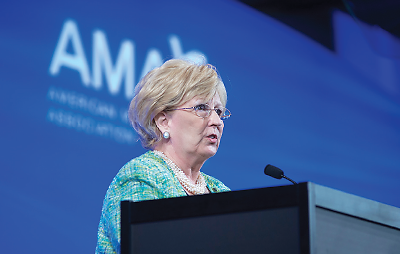AMA President: Hold Politicians Accountable for Health Care Decisions
Abstract
AMA members are urged to educate politicians and the public about the role that the AMA plays in improving the nation’s health and protecting the practice of medicine.
The effort in the past year to repeal the sustainable growth rate (SGR) component of the Medicare payment formula—resulting only in yet another temporary patch—was killed by politics as usual in Washington, said outgoing AMA President Ardis Hoven, M.D., during her address at this year’s policymaking meeting of the AMA House of Delegates.

A major grassroots effort was mounted by the AMA around what has been its top legislative priority for most of the last decade—reforming the Medicare payment system and eliminating the SGR—only to see it fail, Hoven said.
Hoven said the enormous effort that coalesced around HR 2810, the Medicare Patient Access and Quality Improvement Act of 2013, could be built upon in the future. That bill would have replaced the SGR with a value-based payment while providing a period of budgetary certainty for physicians; instead, Congress opted for another temporary adjustment to physician Medicare payment.
“I know many of you looked at the outcome of our SGR effort—another temporary patch—and wrote it off as a failure,” she said. “But let me tell you what I saw. . . . I saw a House of Medicine that had been deeply divided by conflict over the Affordable Care Act come together to fight for America’s seniors. I saw members of the [AMA’s] SGR task force . . .develop a set of principles for replacing the SGR. And I saw over 100 physician groups embrace those principles. I saw an SGR repeal campaign that garnered over a million emails and 45,000 phone calls to Congress. I saw a year of intensive advocacy culminate in bicameral, bipartisan legislation to replace the SGR with a system that encourages innovation. I saw an unprecedented 600 medical organizations come together to support that legislation.”
She added, “I saw politicians on both sides of the aisle—in the Senate and the House—voice their approval for the legislation. I saw them look me in the eye and tell me they would get it done. And then, a few weeks later, I saw those same politicians vote that bill down.”
Hoven said it was not the AMA that failed the country’s physicians and patients, but Congress. “Recall that the price tag for SGR repeal had been cut in half,” she said. “Recall that the pathway for transitioning to a more effective system was there. Recall that three separate congressional committees devoted countless hours and countless taxpayer dollars to develop a solution. Recall that the AMA lobbied successfully for several crucial legislative improvements, achieving a set of Medicare payment reform policies that enjoy broad support among Congress and physicians. No matter how you look at it, in the end just one thing prevented Medicare reform from passing—politics.
“So where does that leave us? If organized medicine flexed its muscle and it wasn’t enough to make Congress do the right thing, what is our course of action going forward? How can we make progress not just on the SGR, but on the other challenges confronting our health care system?”
Hoven offered three proposals for moving forward. The first is to hold politicians accountable. “We physicians are held accountable every day,” she said. “It’s time Congress was held accountable too. We need to let Congress know that business as usual is unacceptable. It is unacceptable for taxpayers. It is unacceptable for physicians. And most importantly, it is unacceptable for the nation’s seniors. . . . We need to use our votes. We need to remind our elected officials that the nation’s physicians and the nation’s patients matter.”
Second, Hoven said that physicians need to educate politicians and the broader public about the AMA. “One of the biggest surprises to me during my year as president was how many organizations don’t know what the AMA does. I’m talking about businesses, civic groups, even some academic institutions. The misinformation circulating around the AMA is incredible.”
“I can’t tell you how many people think the AMA is just a trade organization fixated on pocketbook issues. Who think death panels are part of the Affordable Care Act. Or that the reason health care costs are soaring is because doctors are charging too much.
“You should see the alarm on their faces when I talk about the SGR and how it spells a more than 25 percent cut to physician pay. . . . You should see how surprised they are to hear the AMA is working to reduce the toll of diabetes and cardiovascular disease. That the AMA brought national attention to the plight of the uninsured during the 2008 election cycle. That when patients and physicians were being overcharged for out-of-network services, the AMA went to court and won a $350 million dollar lawsuit on their behalf.”
Finally, she said, physicians need to be leaders in their communities. “At the end of the day, health care is local. And if we want to improve health care in this country, it starts at home,” she said. “If we want to tackle obesity, we need to collaborate with local schools and community organizations. If we want to teach the newly insured about the importance of prevention, we need to work with community health centers. If we want to explore accountable care organizations, we need to reach out to hospitals and other potential partners to talk about collaboration.” ■
A video of Hoven’s presidential address at the House of Delegates can be accessed here.



